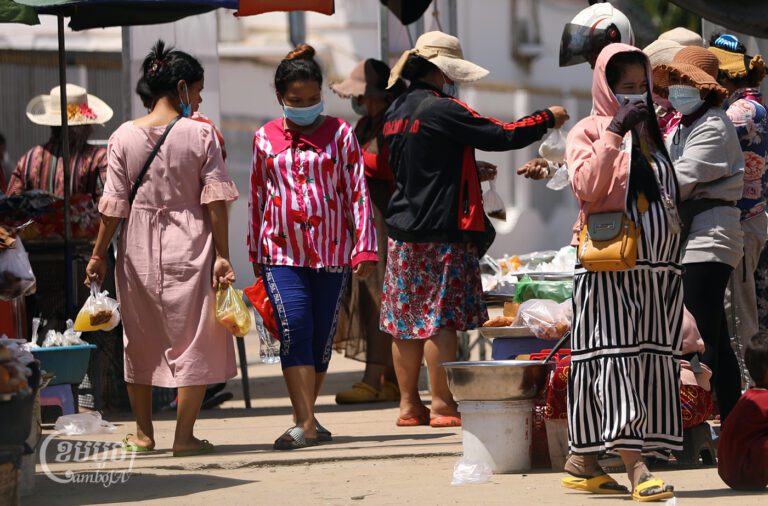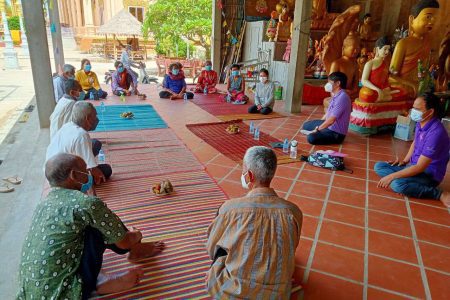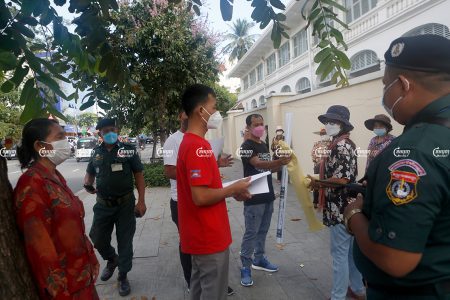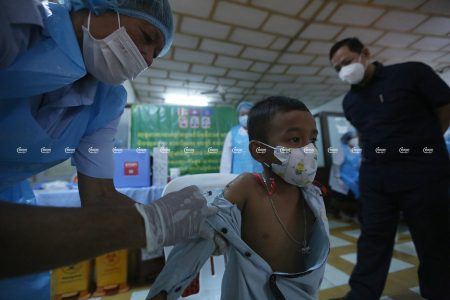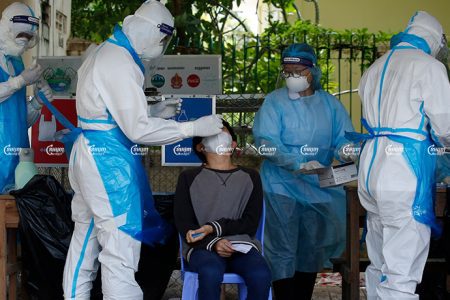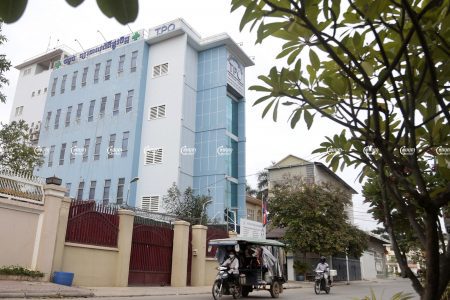Public and private secondary schools were reopened across the country on Wednesday as Prime Minister Hun Sen announced plans to vaccinate children aged from six to 12 against COVID-19 to allow primary schools to reopen as well.
In an audio message released on Wednesday, Hun Sen ordered city and provincial authorities as well as health workers to be prepared to administer the vaccine across the country starting from September 17.
“We have decided to vaccinate children aged from 6 to 12 years old,” he said. “If we do not, we will not be able to open primary schools, because now we can only reopen secondary schools, high schools, and universities.”
The prime minister said that there are more than 1.8 million children aged from six to 12, and that the government will be administering the Chinese-made COVID-19 Sinovac vaccine.
“On the other hand, the vaccines have been studied in many countries and have already been used on children under the age of 12, so the vaccine is not a problem because we already have them in hand,” he said. “We do this so that children at the primary schools can go back to school without fear. And the next step, we are also thinking of children from three to six years old.”
Hun Sen said that so far, more than 1.7 million children between the ages of 12 and 17 have been vaccinated with at least one dose. According to the Ministry of Health, more than 11 million people across the country have received at least one dose of the vaccine.
Local authorities appeared to be monitoring public schools in the city on Wednesday to help enforce public health measures on campuses.
18-year-old student Chang Vantak, who is currently studying grade 12 at Chbar Ampov High School in Phnom Penh, said that he was very happy to be back at school.
“Now we can meet our friends, talk and exchange experiences,” he said. “I will try to study hard to pass the exam this year. I never hoped that I would pass without examinations the same as last year, because the certificate is just a piece of paper, but our own knowledge is important.”
“Learning at home, I felt stressed, uncomfortable,” he said. “We couldn’t concentrate, and sometimes we needed to do housework at the same time that we were learning — very interrupted.”
Last week, some schools in Phnom Penh required parents and students to be tested for COVID-19 before entering. But at Chbar Ampov High School, students said they are not required to be tested before coming to school.
Vantak, who was fully vaccinated, said that even though all students have been informed about health measures such as social distancing, wearing face masks and spraying alcohol or hand sanitizer, he still feels concerned about COVID-19.
“I’m also concerned about COVID-19 because we are at school, we meet a lot of people and we don’t know who is positive or not,” he said. “I am worried that if someone in school is positive, I could bring the virus to my family as well.”
Heng Sreynith, a grade 9 student at Kdey Takoy Secondary School about 10 kilometers from the city centre, said that learning at school is more fruitful than being at home. She told CamboJA she had been tested before coming back to school.
“We can learn directly with the teachers and the teachers can explain the lesson directly and clearly rather than learning online,” she said.
As the number of COVID-19 cases continues to increase, though, Sreynith said she was also worried about potential transmission.
“I’m still concerned about COVID-19, because when someone gets infected, we may not know, and I am worried that the school will be closed again,” she said.

At Kdey Takoy Secondary School, only three classes opened on the first day.
Principal Chheng Seang said the school has so far only reopened in-person learning for grade 9 in the first phase, saying that they will gradually reopen grades 7 and 8 if things are going well.
“We only allow those who have already been vaccinated, and the school provided enough alcohol for the staff and teachers,” he said. “We will strengthen discipline by requiring students to maintain social distancing and hygiene.”
Seang said during the school closure, many poor students could not access education as their families were not able to access online learning for their children.
“Many students living in the lowlands in this area could not access online learning materials, so the school provided them with distance learning materials,” he said.
Som Socheat, a grade 12 student at Hun Sen Bun Rany Wat Phnom High School, said that today’s return to school is not what she had hoped for, because students could not gather as normal.
“The classes have been separated and kept socially distancing, in that class, there are only 15 to 16 students,” she said. “However, I feel scared when I go in there, as we are facing a high risk of contracting COVID, even though I have been vaccinated.”
Outside of Phnom Penh, students are also returning to the classroom. Kampong Speu provincial governor Vy Samnang said that all levels of schools in the province had been allowed to reopen since September 13 after Prime Minister Hun Sen gave provincial administrations the authority to make the decision. He said that there are now 403 schools that have been reopened out of a total of 413 schools across the province.
“The remaining schools are located in high-risk areas of COVID-19, while some schools in the provincial central are used as COVID-19 treatment facilities,” he said. “When all patients recover, we do not accept new patients because we need to reopen all schools.”
Chhoeum Soksan is another grade 12 student at Mongkul Borei High School in Banteay Meanchey province. She said that in rural areas, learning online is very difficult when it comes to listening and when teachers explain the exercises.
“For me, I feel happy that the school is reopened, because this year is the year of exams, so I need to study a lot,” she said.
On September 14, Phnom Penh City Hall announced that 227 public and private educational institutions in Phnom Penh had reopened with a total of 139,578 students.
The announcement said that 10,443 education staff and teachers were tested before schools were reopened, of which 24 staff and teachers tested positive for COVID-19.
Spokespeople for WHO and Unicef did not respond to requests for comment.
On Wednesday, the Ministry of Health reported 653 new cases of COVID-19 and 9 deaths, bringing the total count to 101,443 cases and 2,067 respectively since the pandemic began in early 2020. The ministry has also recorded 95,357 recovered cases.



